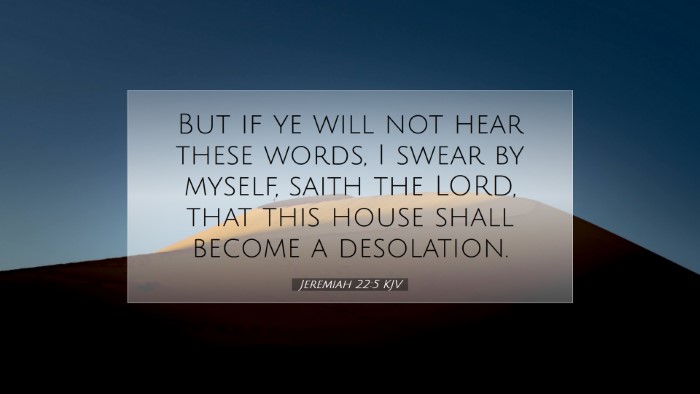Commentary on Jeremiah 22:5
Verse Text: "But if ye will not hear these words, I swear by myself, saith the Lord, that this house shall become a desolation." (Jeremiah 22:5 KJV)
This passage forms a significant portion of God's message to Judah during a period of deep moral corruption and impending judgment. In this commentary, we will explore the theological and historical implications of the verse, drawing from the insights of renowned public domain commentators such as Matthew Henry, Albert Barnes, and Adam Clarke.
Contextual Background
The context of Jeremiah 22:5 is vital for understanding its full weight. Jeremiah, a prophet known for his poignant proclamations against the sins of Judah, specifically addresses the monarchy, calling King Jehoiakim and the people to repentance. The 'house' referenced here is not merely the physical structure but symbolizes the royal lineage and the Davidic covenant.
Thematic Insights
Divine Judgment and Conditionality
Albert Barnes emphasizes that God’s pronouncement is conditional. The phrase "if ye will not hear these words" indicates that the impending judgment hinges on the people's response to the prophetic message. The divine warning is clear: hearing and heeding God's word is essential for avoiding desolation.
Matthew Henry underlines that God’s oath by Himself signifies the seriousness of His intentions. This is not a whimsical pronouncement; it is a determined declaration grounded in divine authority. Henry warns that when God swears, it ought to be seen as an ultimate affirmation of His word, compelling the listener to reflect deeply on their actions.
The Consequences of Rejection
Adam Clarke elaborates on the consequences that manifest from a refusal to listen. The idea of the house becoming a desolation illustrates the totality of destruction that can come from disobedience. Clarke notes that this serves as a prophetic warning, showing the correlation between moral failure and physical desolation; a principle that holds true not only in the context of Judah but throughout biblical history.
Theological Reflections
God's Sovereign Authority
At the core of this verse is the assertion of God's sovereign authority over nations and leaders. Matthew Henry reinforces that God's sovereignty is unassailable and that even the mightiest of kingdoms cannot withstand His judgment when they turn away from His commandments. The passage serves as a reminder that while God is a God of mercy, He is also just and will hold individuals accountable for their transgressions.
Repentance and Restoration
The call to repentance is implicit in the warning given. Albert Barnes remarks that even at this grim juncture, there remains an opportunity for the king and his people to amend their ways. The nature of God is one that, despite declaring impending judgment, still offers a path back to grace through repentance and change.
Practical Applications
- Heeding God’s Word: The necessity of listening to God's warnings is pertinent for contemporary believers. Each generation is called to evaluate its adherence to divine statutes.
- Understanding Consequences: The linkage between behavior and consequence, as highlighted in this verse, encourages self-examination and accountability within both personal and communal faith contexts.
- The Role of Prophets: This passage underscores the importance of prophetic voices in society. Pastors and church leaders should recognize their role in calling congregations back to faithfulness.
- Hope Amidst Judgment: While the declaration of desolation appears bleak, the possibility of redemption remains. This serves as a crucial reminder that even in dire circumstances, God’s grace is accessible to those who genuinely seek it.
Conclusion
Jeremiah 22:5 stands as a solemn warning, laden with the weight of God’s covenant promises and the seriousness of His judgments. As the church navigates a world that often mirrors the moral decay of ancient Judah, this scripture calls for a vigilant attention to God’s words. Through remorse and repentance, current generations can avert desolation, finding hope and restoration in the steadfast love of God.


